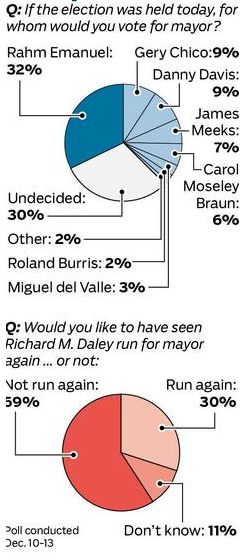|
Question of the day
Wednesday, Dec 15, 2010 - Posted by Rich Miller * What do you think Gov. Pat Quinn asked Santa for this year? Snark heavily encouraged, of course. Comments composed as actual letters to Santa win extra points.
|
|
And the winners are…
Wednesday, Dec 15, 2010 - Posted by Rich Miller * Golden Horseshoe for best commenter was pretty easy to choose. Wordslinger gets it. Even Bill, who generally hates everybody, nominated him…
Honorable mention goes to my old friend Steve Schnorf. Here is Yellow Dog Democrat’s nomination…
* Best non-political legislative staffer is Jessica Handy of the Senate Democratic staff. Jessica told me she was taking herself out of the running because she left staff last week for another job, but this isn’t a prospective award, it’s for the past year, so she wins…
Honorable mention goes to John Hollman…
* A roundup of all our winners, with honorable mentions in parentheses…
Congratulations to all! * Anyone up for a holiday party? It’ll probably have to be in Springfield, unless we do it the week between Christmas and New Years Eve.
|
|
*** UPDATED x2 - Coroner issues report - Arrangements announced *** State Police director stonewalls all questions on Davlin death
Wednesday, Dec 15, 2010 - Posted by Rich Miller * I have a meeting with State Police Acting Director Jonathon Monken later today to ask him about yesterday’s worthless and perhaps even harmful press conference….
Not good at all. There’s really no excuse for withholding all information from the public. Last I checked, this was still a democracy. But we’ll see what Monken says.
*** UPDATE 1 *** Strike those times and dates. Renfrow may have made a mistake. Checking. *** UPDATE 2 *** From the SJ-R…
And..
The paper also has the funeral route procession. * Roundup…
|
|
Emanuel on the stand and ahead in the polls
Wednesday, Dec 15, 2010 - Posted by Rich Miller * I’m sure they’ll find a way to do it, but I don’t think anyone can say that Joe Morris was unfair to the people objecting to Rahm Emanuel’s candidacy during yesterday’s 11-hour hearing. Morris only lost his cool a couple of times. Objector Jeffrey Joseph Black was going on and on about some weird thing or another and claiming that Morris was helping covering up for Emanuel, Morris finally said “I don’t know if I have contempt powers, but I’m getting close to wanting to find out.” He probably should’ve done that before the hearing. Check out this exchange with Black…
Another objector asked Emanuel if he was a citizen of Israel and if he was a “freedom fighter” for Israel. And…
Sheesh. * If you have time, take a look at the video of some of the objectors’ oftentimes bizarre and almost uniformally ill-informed “questions”…
* Kass makes a good point…
That same thought crossed my mind about Daley as well. Can you imagine? Oy. * But Kass is completely wrong to claim that state law is cut and dried on this issue…
The law doesn’t say “lived” it says “resided,” and “resided” is a legal term. Legal terms are open to interpretation and that’s what this case is all about. The statute…
* The end of the hearing was interesting, however. Emanuel has so far succeeded in convincing Morris not to call his wife to the stand. But he was forced to admit that perhaps his wife would know more about certain aspects of the case under questioning. We’ll see. * In other news, the Chicago Tribune has a new poll showing Rahm Emanuel leading the pack with 32 percent. Gery Chico and Danny Davis are tied for second, but are in single digits at 9 percent…
 The Chico campaign is claiming that Emanuel is losing support even as he spends cash. From an internal campaign memo…
* Related…
|
|
Morning Shorts
Wednesday, Dec 15, 2010 - Posted by Rich Miller * Chicago neighborhood integration grinds to halt, according to Census data: Here, 81 percent of blacks would have to move in order to be distributed as evenly across the city as whites, down slightly from 83 percent in 2000, according to a Sun-Times analysis of data from the Census Bureau’s 5-year American Community Survey. For Hispanics, that figure is 49 percent for 2009 compared to 47 percent in 2000… Nationwide, a similar index calculated by professors from Brown University and Florida State University showed an average of 65 percent for black-white segregation and 52 percent for Hispanics. * Lincoln-related tourism drops after 200th anniversary of birth: A post-bicentennial drop in tourism numbers reduced attendance by more than a third at some Lincoln sites this year. Hotel stays also fell. But tourism and historic-site managers say the fall-off from the 200th anniversary celebration in 2009 of Abraham Lincoln’s birth was anticipated. They remain encouraged that numbers in most cases were ahead of 2008 * Madison, St. Clair counties among ‘judicial hellholes‘ again * IL hospitals spent billions on community benefits: A new report details billions of dollars in community benefits that Illinois hospitals contributed in their 2008-09 fiscal years. * Illinois wants shoppers to pay up on online taxes * Olin Brass may move headquarters * Brookfield sets amusement tax on zoo * Brookfield Zoo cuts 11 jobs to balance budget * Wal-Mart Eyeing Bucktown Location? * Center for women shuts down: One of the city’s pioneering social service entities to combine non-profit and for-profit strategies to train low-income women for work has folded — a victim of the economy. * Mitsubishi workers set to vote on contract changes * Cook County orders audit for promotions and pay hikes * Preckwinkle makes financial checks in first Cook County Board meeting * Former Chicago revenue inspector accused of soliciting bribes * Northwestern attorneys seek to seal evidence in wrongful conviction case * Career prosecutor sworn in as DuPage state’s attorney - Robert Berlin was sworn in Tuesday morning as DuPage County state’s attorney after a 17-0 vote * Gordy Hulten is new Champaign County Clerk: He’s the designee to replace Mark Shelden who held the job for 13 years. * Horse racing returns to McHenry County * Bolingbrook officials to consider slashing alcohol sales tax in half * School district considers ‘sexting‘ policy * Rockford School Board restores high school honors classes * U. of Ill. starts search for Urbana chancellor * St. Clair County deputies reject offer; 13 of 46 could lose jobs * State GOP co-chair from Aurora * Cahnman found not guilty in solicitation case: Springfield defense attorney Dan Fultz argued to the seven-woman, five-man jury that Cahnman didn’t solicit the women, but simply accepted the offer they made to him. “You can think he was stupid, you can think that he was morally wrong, but he’s not on trial for any of that,” Fultz said.
|
|
Protected: SUBSCRIBERS ONLY - Supplement to today’s edition
Wednesday, Dec 15, 2010 - Posted by Rich Miller
|
|
Protected: SUBSCRIBERS ONLY - Today’s edition of Capitol Fax (use all CAPS in password)
Wednesday, Dec 15, 2010 - Posted by Rich Miller
|
| « NEWER POSTS | PREVIOUS POSTS » |















